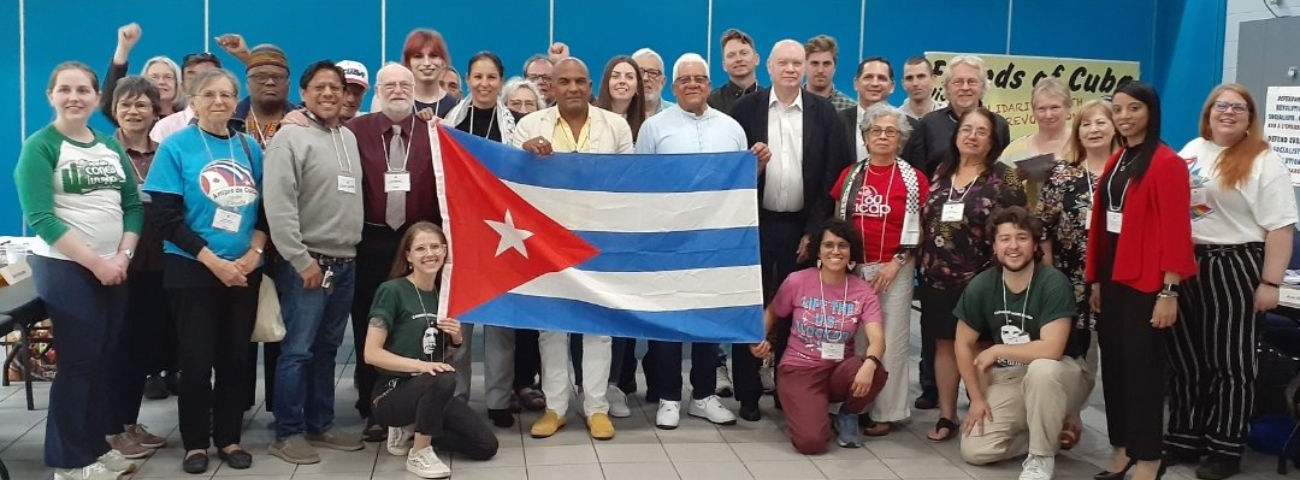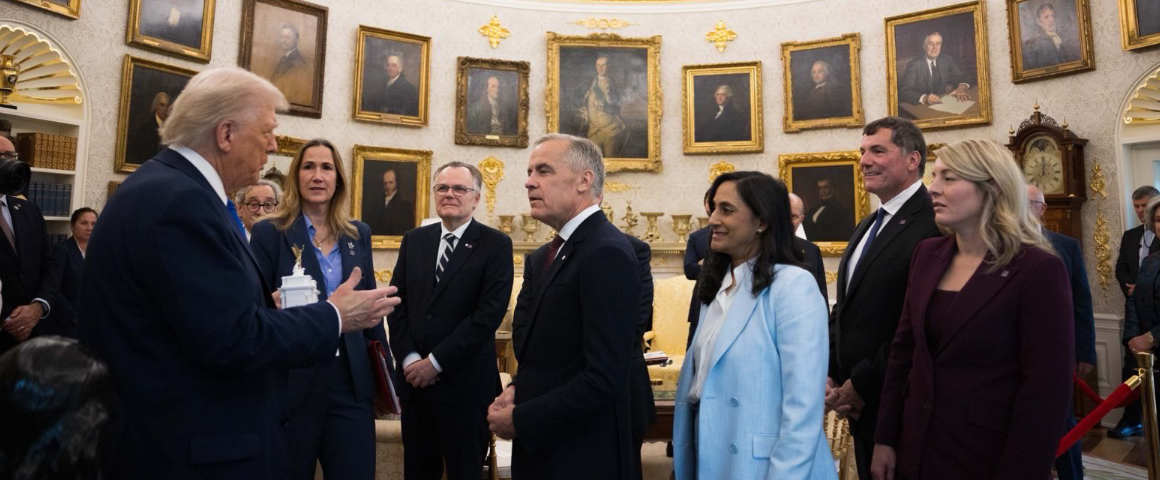As part of the “Cuba and the global struggle for peace” tour, Leima Martinez of the Cuban Institute for the Friendship of the Peoples (ICAP) visited several cities in Canada last month. During her stop in Toronto, Martinez spoke with People’s Voice contributor and long-time peace and solidarity activist Miguel Figueroa.
In general, how could you describe Cuba’s role in the struggle for peace?
Cuba has played an important and leading role in trying to preserve peace, through its commitment to the principles of the Revolution. That is, to transform the social basis of Cuba from the Triumph of the Revolution, and to be supportive of other countries by means of internationalism and collaboration. One of the concepts that Fidel Castro left as a legacy was to establish different types of relationships with other countries. At the beginning of the Triumph of the Revolution, Cuba was very much involved with the countries that were part of the Bandung Conference, and after 1959 Cuba prioritized the work that the Cuban Movement for Peace (MOVPAZ) was doing for so many years.
[Editor’s note: The Bandung Conference, held in 1955, was the first large scale conference of Asian and African states. It focused on promoting economic and cultural cooperation and opposing colonialism and neocolonialism, and was a precursor to the Non-Aligned Movement.]
In recent years, you have probably read and seen how Cuba is involved in finding solutions to conflicts like the one in Colombia. This conflict is not only affecting Colombia, but the Caribbean and Latin America countries, and Cuba is playing a leading role in the solution. You know about the peace agreements that were signed a few years ago in Havana, but it didn’t stop there. Recently, another guerrilla group started conversations with the Colombian government in Cuba.
I mention this because, even though Cuba is playing this role in these specific initiatives for peace, at the same time Cuba is vilified for doing this. While being supportive of the solution for the Colombia conflict, Cuba was included in the unilateral list that the United States has, of countries that allegedly sponsor terrorism. So, fulfilling the principles of the Revolution have also made the Cuban people suffer for pursuing peace, and that’s why we highly appreciate the support of organizations like the World Peace Council which shares the same concerns about peace as Cuba, as well as many other solidarity organizations which do proper research on how Cuba is supporting different nations.
A big issue for Cuba is the US military base at Guantanamo, but the issue of foreign military bases is a global one. What initiatives does Cuba take to help build the movement against foreign military bases in general?
The military base you mentioned is occupying part of the territory of Cuba. That was an agreement that in an illegal way was imposed on the former government of Cuba, prior to the Triumph of the Revolution. That’s why the Cuban people have been calling attention on the need to not only return the land to the people of Guantanamo.
But Cuba also has been very concerned about the use the United States has given to that land. As you know, they have big facilities where they put international prisoners, with no legal status and no legal process – some of them have no charges against them at all. So, it is a double attack on Cuba – first, the occupation of the land; and second, to use that territory in an illegal way for horrendous purposes. The world has known about this and has supported Cuba for the closure of the military base.
This naval base is also threatening the area because it is a hub for all the maneuvers the United States do in the Caribbean, and it is a threat to other nations in Latin America. This naval base is connected with many others the US has which surround other Latin American countries. The Cuban Institute for the Friendship of the Peoples (ICAP), together with the peace movement of Cuba, has been organizing a seminar every two years against foreign military bases. People from the World Peace Council and other peace organizations go to Guantanamo to talk about the dangers of militarization and the arms race.
There, we welcome activists from various countries that have been affected by the occupation of their land and by the devastation of their land due to the military training. In many of these military bases, nuclear weapons have been tested – like in Vieques, Puerto Rico or Okinawa, Japan. So, friends from these other countries, where their lives are in real danger due to those military bases, are gathering in Guantanamo every two years.
The final declaration of this year’s seminar is very much focused on eliminating all foreign military bases, on stopping the arms race, stopping the escalation of nuclear threats, and also looking at other ways to solve the conflicts and the differences each country can have.
We consider this to be an important event which should be preserved, to unite voices from the different countries and organizations and to really put an end to the use of foreign military bases and other ongoing threats like the genocidal attacks on Palestine – Israel is the biggest military base the US has, and from Cuba we call for a ceasefire and for freedom for the Palestinian people.
Currently, the issue of nuclear weapons development and proliferation is becoming ever more important. What is Cuba’s historical role in the campaign for nuclear disarmament, and how has that role developed in the recent period?
Cuba supports the calls at the United Nations for the elimination of nuclear weapons. In fact, we are one of the countries that years ago signed the treaty for the elimination of nuclear weapons – I think we were among the first ten countries that signed that agreement – and since then Cuba hasn’t stopped calling, in either bilateral relations or multilateral forums, for an end to proliferation, tests, research and funding of nuclear weapons.
For many years, we have had close ties with organizations that are very vocal against nuclear weapons. One of the countries that suffered the most from these weapons is Japan. Fidel Castro, on the last visit of Japanese friends to Cuba, dedicated hours to talking with them about the effects of the nuclear attack on past and current generations of Japanese people. Because it killed thousands of people at the time, and those who survived, called hibakusha, are still suffering from both health conditions and the stigma of living with a disability. In the last years of his life, Fidel Castro welcomed the Peace Boat project, which is an international solidarity project calling for the elimination of nuclear weapons.
In the area of Latin America, Cuba has been very focused on supporting the call and declaration – from ten years ago – of Latin America and the Caribbean as a zone of peace. It means not only to solve the differences among countries through dialogue and peaceful ways, but to call for no use at all of nuclear weapons and no nuclear weapons tests in our region. This was led by Fidel, by Cuba. This is the tenth year of the declaration of Latin America and the Caribbean as a zone of peace, and we at ICAP are also committed that social organizations support their governments in maintaining this declaration. Ten years on, many Latin American countries have changed governments or changed tendencies, but it is the responsibility of all of us is to maintain our zone of peace, no matter who is in leadership in the countries.
The emergence of the BRICS community of states offers several countries, including Cuba, with some economic and trade alternatives to the US-dominated systems. How does this relate to the struggle for peace, and how does Cuba view this issue of multipolarity?
Cuba is among those countries that support the concept of multipolarity. In fact, as I mentioned, since the Triumph of the Revolution Cuba has supported the concept of a collective effort for the development of our countries and the pursuit of peace.
I mentioned the Bandung Conference, and later the Non-Aligned Movement, in which Cuba played an important role in raising the voice of the Global South. At the United Nations, Cuba has been respected for this concept of dialogue with all countries. Last year, Cuba was head of the G-77, leading the efforts of more than 134 states, and important agreements were established in matters of the environment, law enforcement, disputes between some of the countries, and also in new opportunities for economic trade.
This is the case with BRICS. Last year, thanks to the efforts of different countries led by Cuba, the G-77 had two important meetings. One was the G-77 plus China, looking for equilibrium between the Global South and the emergence of new economic powers like China. And another related to the environment, because most of the countries of the South are seeing how their lands are affected by climate change. Our nations are mostly affected not by mistakes that we make, but by overconsumption by the big powers which are, through their industries and other enterprises, devastating and contaminating their lands and ours.
The islands of the Caribbean and the Pacific are seeing sea levels rise every year, and climate researchers are saying that in a few years some of those islands will disappear. So, what is at stake for islands like Cuba is the lives of our people. That’s why Cuba has been so concerned about moving forward on multilateralism.
And this is also why the hegemonic countries like the United States and its allies are more aggressive than ever – because it is true that the instruments for countries to collaborate have increased, and they interpret as a danger to their domination.
Cuba’s path is to respect the sovereignty of all countries and to look, of course, for their respect of ours.
[Photo: Toronto event on “Cuba’s role in the global struggle for peace”]
Support working-class media!
If you found this article useful, please consider donating to People’s Voice or purchasing a subscription so that you get every issue of Canada’s leading socialist publication delivered to your door or inbox!
For over 100 years, we have been 100% reader-supported, with no corporate or government funding.




